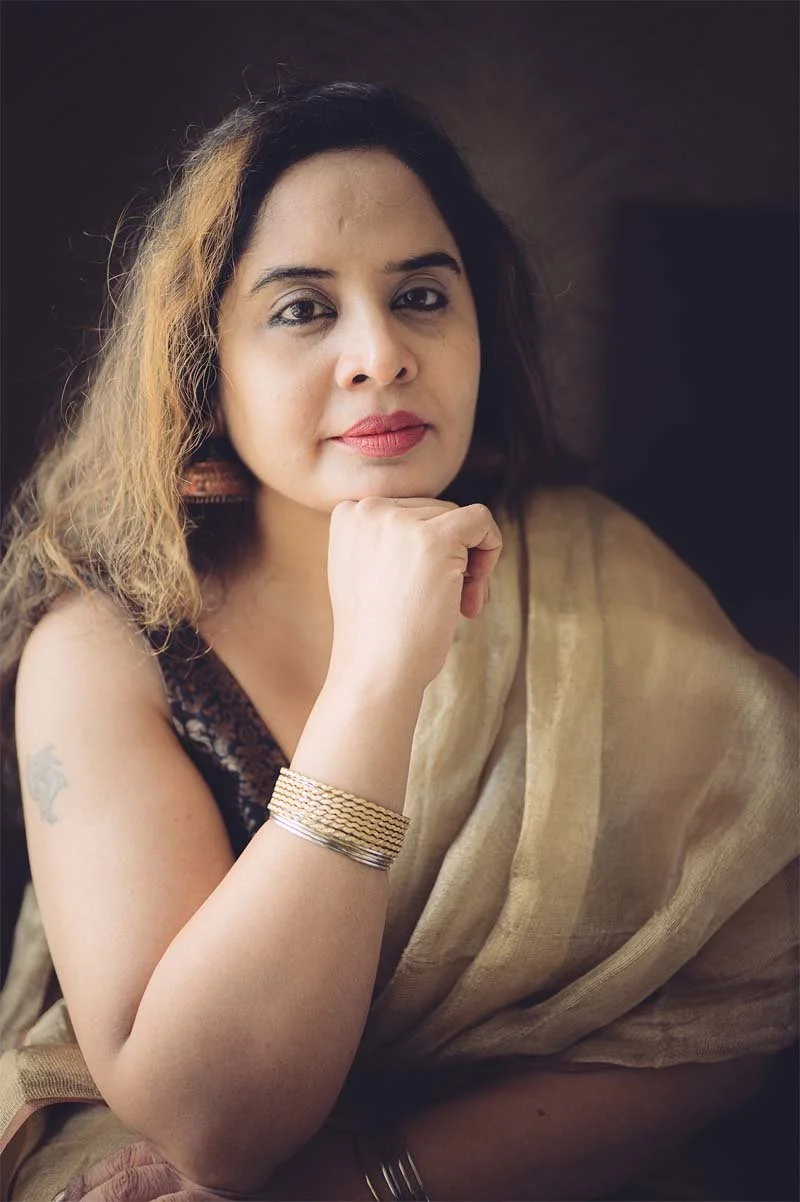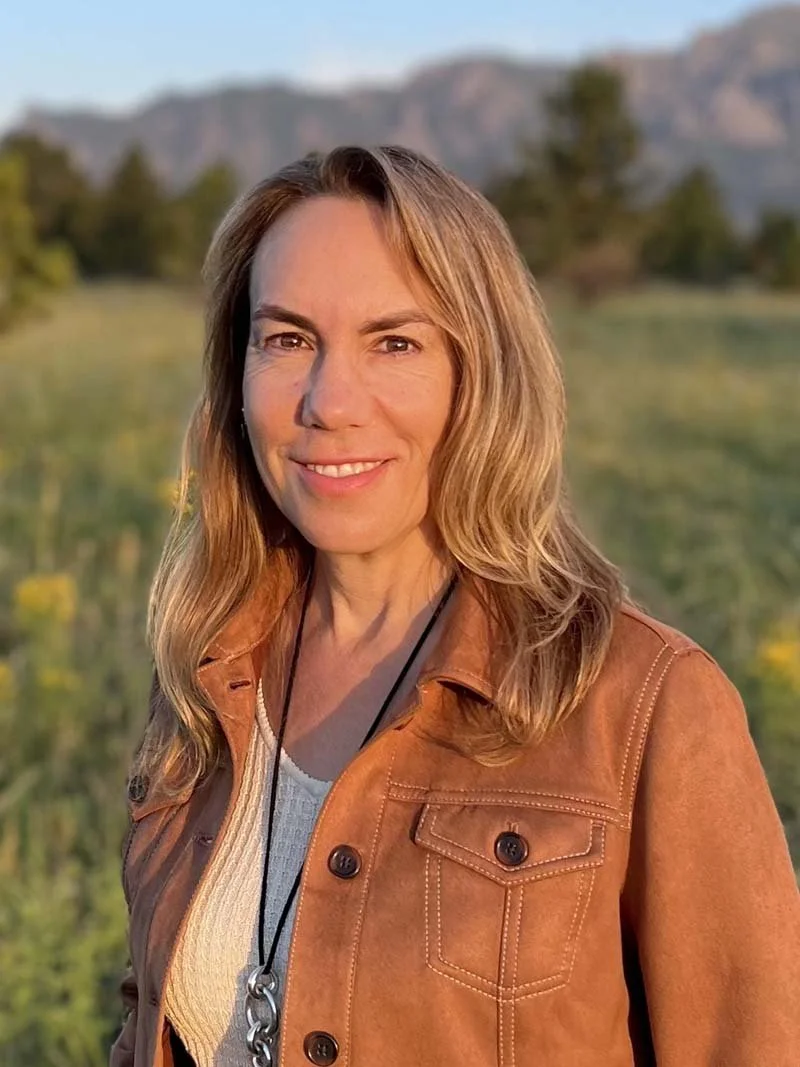Rochelle Potkar is an author, poet, and screenwriter, and an alumna of the Iowa International Writing Program and the Charles Wallace Fellowship at the University of Stirling. Her works include Four Degrees of Separation, Paper Asylum (shortlisted for the Rabindranath Tagore Literary Prize), Bombay Hangovers, and Coins in Rivers. Her poetry has won international acclaim, including the Norton Girault Literary Prize, and has been widely translated. A poetry-film collaborator and screenwriter, her screenplay A Brown Coat was a quarter-finalist at the Atlanta Film Festival. Potkar regularly mentors emerging writers and teaches at the Himalayan Writing Retreat. @rochellepotkar
You were born and raised in Kalyan near Bombay/Mumbai. How did it influence your writing and your thinking about the world? I have a small-town heart that always aspired for the city of Mumbai.
This slow small town of the 90's gave me my earliest impressions of people from my large joint family, community, school, and society - many of whom became characters in my stories, in refracted ways as if they were endless reservoirs of humanity. I soaked in this microcosm before attempting to understand macrocosms. Even before I was a storybook reader, I read people like books, curious of where they had come from, where were they going to, why they did what they did, and the difference between their preaching and their practice. Even now in the present, my newly released first novel The D'Costa Family, has the wayward cock-and-bull concoction of those yesteryears and yesterpeople, written in a slapstick style.
Were you the kind of kid who always had a book in hand? Which ones stood out? I wasn't a library kid. I only read story books I won as prizes for elocution competitions and annually for high grades. Even when I scored the highest in English and History in my Xth grade, I took up commerce and later did an MBA and a PG in Marketing and Advertising.
I read plotted, fast-paced genre fiction or for some years no book at all. As a corporate professional, I read business books or one novel a year. So my coming of age as a reader happened in my quarter-life, when I fell in sudden love, deep reading The God of Small Things. I realized there was a genre called Literary Fiction which was so intimate and meditative, it had the power to change something deep within. That was also closer to the time when I was detouring from my corporate job into the Arts, and was feeling very restless and unhappy. I believe ideas in all forms come to you like water when you are very parched.
Describe your typical writing day. I work from dawn to dusk and show up come rain or storm, low days, dull days, moody days, moony days, days of no inspiration or period cramps, flu, fever, pandemics and even days with 5 submission-rejections. I am a early-morning person; I prefer creating new work in the morning, editing in the noon, and submitting/pitching in the nights (which I call my wilting hour). I am very precious about my mornings. I work on multiple projects and let stories or ideas call me back when they want my attention, when are ready for the next leap. I also let my creative moods decide what to work on and in what sequence. My creative side is like an unruly child. It rarely cares for the project-manager side of me. I outline my novels and screenplays. Poems, of course, are lightening bolts that happens in one exhalation not entertaining even one thought between its nanosecond-ness of expression. For fiction, I prefer to write the whole story and then with new eyes edit the second draft and through news lens work on subsequent new drafts sometimes through lens of style, character interiority, atmospherics, mood and tone, phrasing and language, dialect n' dialog.
Tell us about the creative process behind your most well-known work or your current writing project. My earlier works were poetry. My current work is spec. film scripts across genres or then this newly released novel: The D'Costa Family. So let me talk about this one. I wanted to catharize all my childhood cacophony of the people I grew up amid - mostly Goans and Anglo-Indians in small Catholic church-going communities. Though I added a lot of drama to this novel because of my screenwriting impulses, it is still my gossipy whisperings of childhood in the book in a slant ward way. I used a lot of what-if's and exaggerations for each character, also using up my paranoid-imagination of what all they could have done. And voila! - you have gun violence with no bullets, fights over papayas in serious real-estate battles, efficient cops with histories of solving chappal-robberies. Writing this book had a continuous chuckle going on inside me. I doubt I can be that indulgent a writer having so much fun as I did with this book. There are many serious issues to write on. Life can't be all that haa-haa-hee-hoo, or so I tell myself.
What’s the role of keeping a notebook in your creative practice?
For each project I have something called an aide document where I archive all research and ideas like a mood board. For the wisdom and reflections around my writing life, I have an e-file called Chrysalis where I stack my epiphanies, dream visuals, wise-whisperings from those that watch over me, hoping one day to turn it into a memoir or memento mori. Just three days ago, I had this gift of an epiphany: "If you are serious about your writing career, you will fail. If you are playful, you will succeed." I don't know who telepathically communicated this to me, but I am following it :D
How do you research and what role does research play in your writing? I research only as much is required, not a pinch more. Like salt sprinkled to taste in a dish.
I am wary of research drowning out imagination but I like stories to be relatable too. I remember many readers asking me if I was a Math graduate because of the references woven in my short story The Arithmetic of Breasts (Bombay Hangovers). Research should serve not disrupt fiction-storytelling. It has a different part to play in realism Vs. escapism. In the latter, it is only to calibrate how much is too much a suspension of disbelief or surrealism. Though I vote strongly for implausibilities since they are less bizarre than all the realities around me.
If you had one night to dine with any literary figure, who would it be? Margaret Atwood for the prolific legend that she is. Namdeo Dhasal, the fiery Dalit poet who was also a taxi driver and jotted down his poems on cigarette paper, unrolling them, whenever a poem struck him.
How do music, painting, dance and other art forms inspire your writing? Being poet, novelist, screenwriter and playwright, these forms inform and enrich each other for me.
My other sources of stimulation are: music, fine art, stand-up comedy, movies, nature and life, and people from different walks of life. The Japanese short poetry forms (haiku, haibun) speak of Memory as the sixth sense and that too is my school of thought: a tangential quantum physics - a reservoir of story beats and fluid human interiority.
AI and technology are changing the ways we write and receive stories. What’s your response to the idea that AI could “write” literature in the future? And why is it important that humans remain at the center of the creative process? I think AI will be an unpaid assistant at best, doing the mundane tasks as we are left with the magic.
Let's say there was singularity and AI took over, it would be a metallic cold place - not as warm as human experiences. The humor is in human flaws and imperfections - things going wrong. That make life in its hullaballoo interesting. Who wants super-perfection? It's sterile. I don't fear AI because it's going to be perfect. It will need commands to err.
Tell us about some books you've recently enjoyed and your favorite books and writers of all time. So because I came to being an avid reader very late, I have read out of syllabus, very varied and widely.
I haven't had a chance to hangout with one school of thought over the other. I have had to take it all in simultaneously, because I had no clue I was going to be a writer or screenwriter. Life didn't inform me about this. I was setting out to be a Corporate queen, you see?
Hence I don't have particular favorites. Yet Chekov, Manto, Borges, García Márquez, William Trevor, Ismat Chughtai, Jhumpa Lahiri, Arundhati Roy are my all-time favorites. Their work stays for long inside me. I believe in the residual nature of resonance.
Exploring literature, the arts, and the creative process connects me to… the divinity of the creative soul - the reason why we like fish swim into our own personal and collective unconscious. It connects me to the richness of the purpose of our existence to learn and grow in knowledge and apply that around us, combatting cruelty with kindness and growing with art in empathy. Because all art deepens empathy. The day we are 100% arrived, we won't need art on the other side of the continuum. We would be kind to each other, caring, empathetic, intuitiveness, and telepathic. We wouldn't need art to fit into any other shoes. We would know.















































































